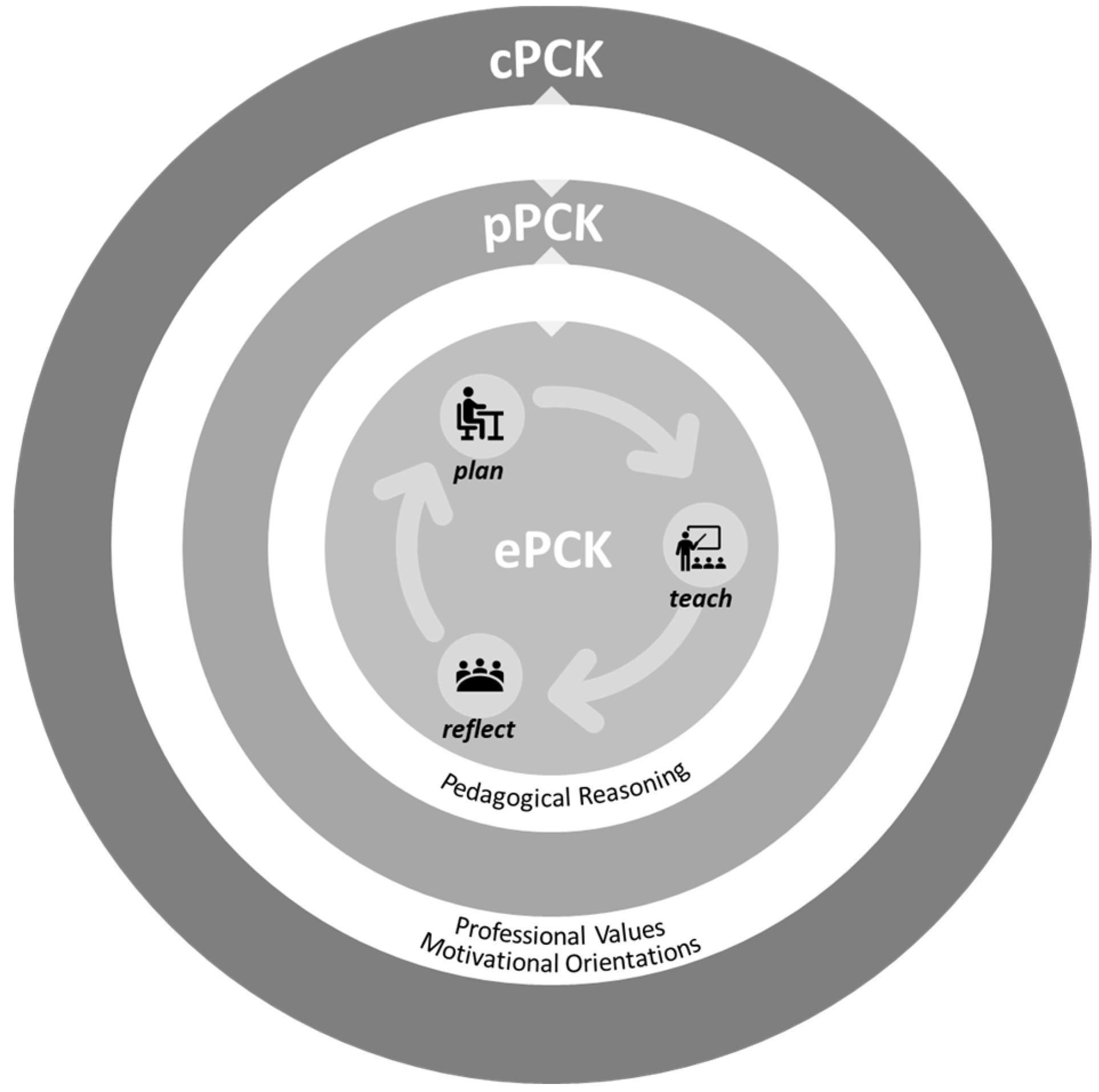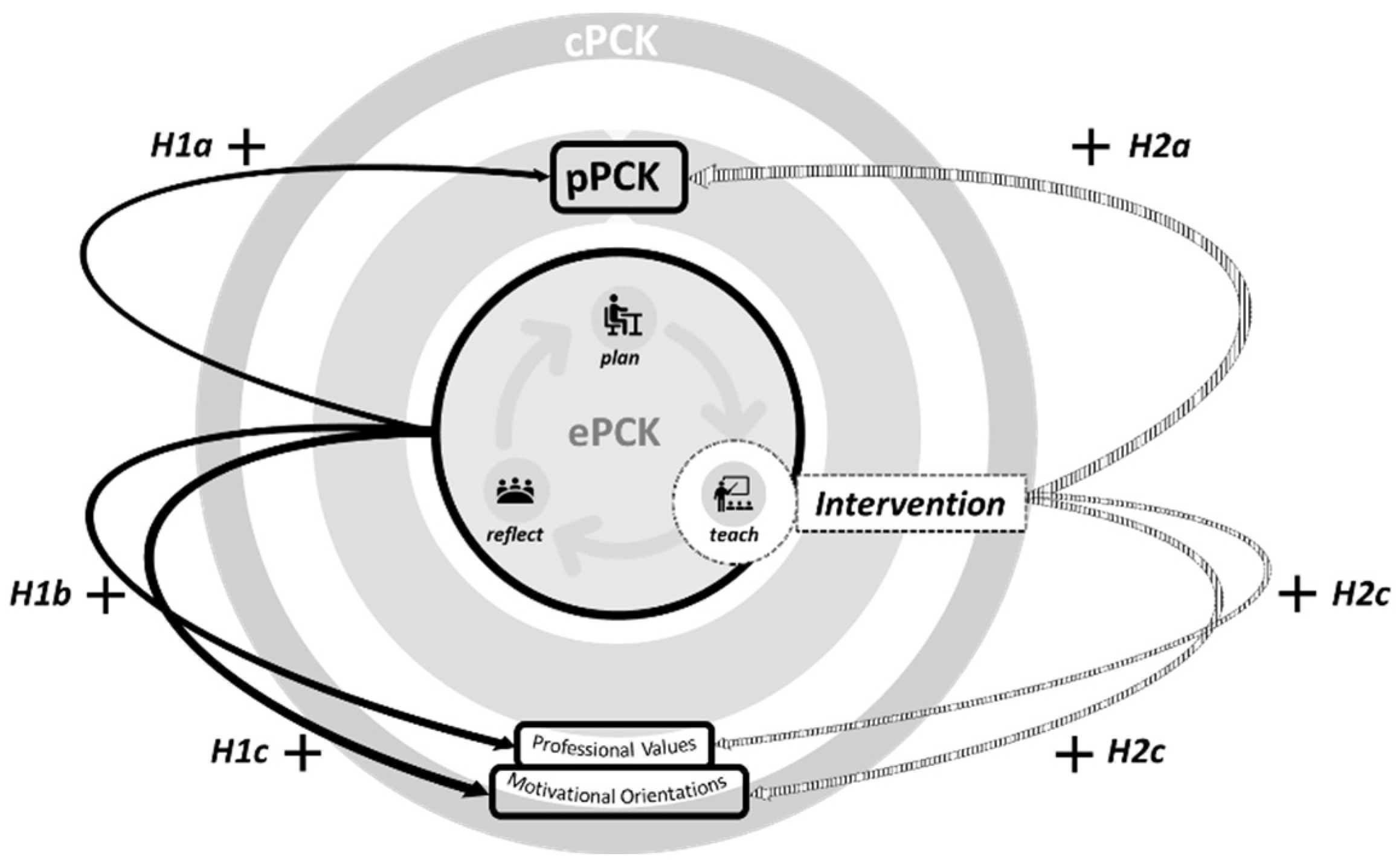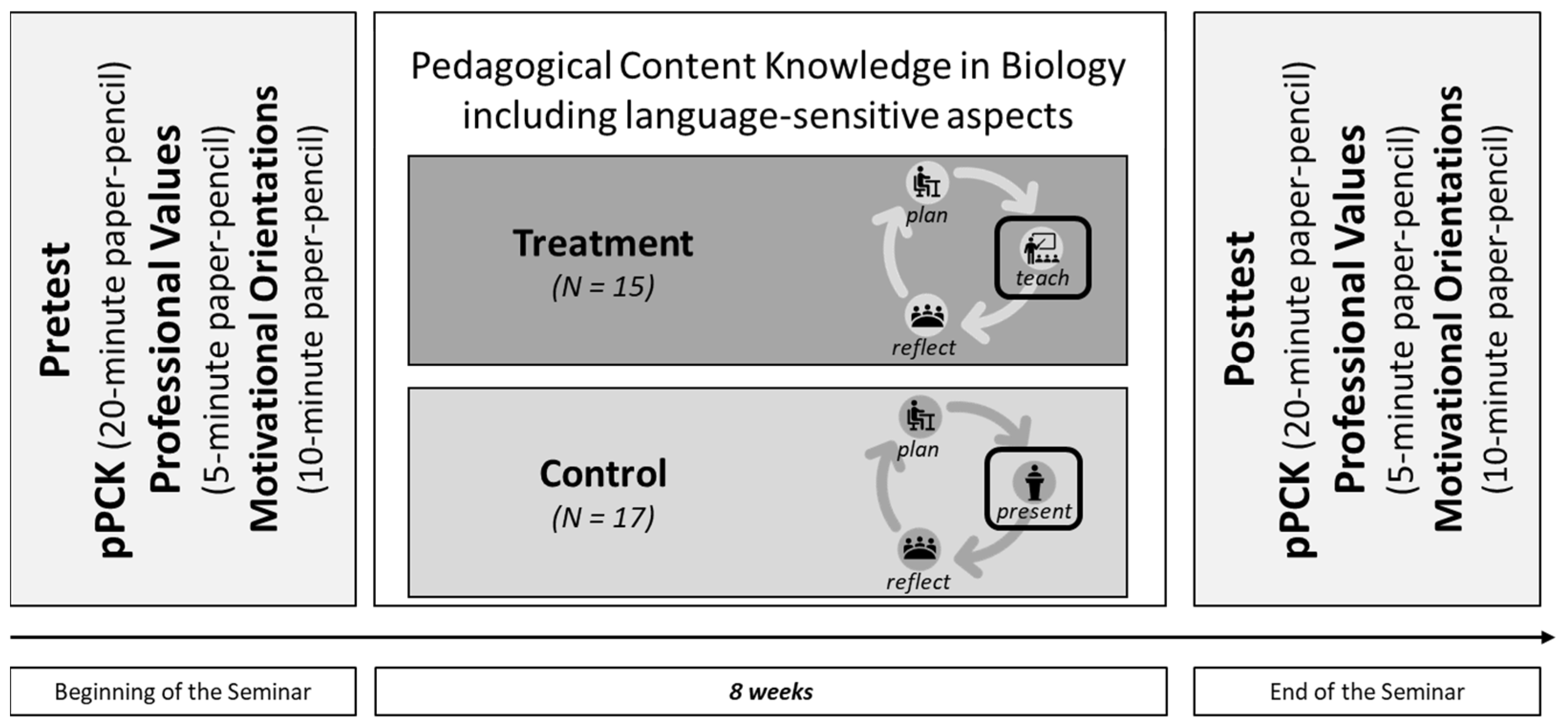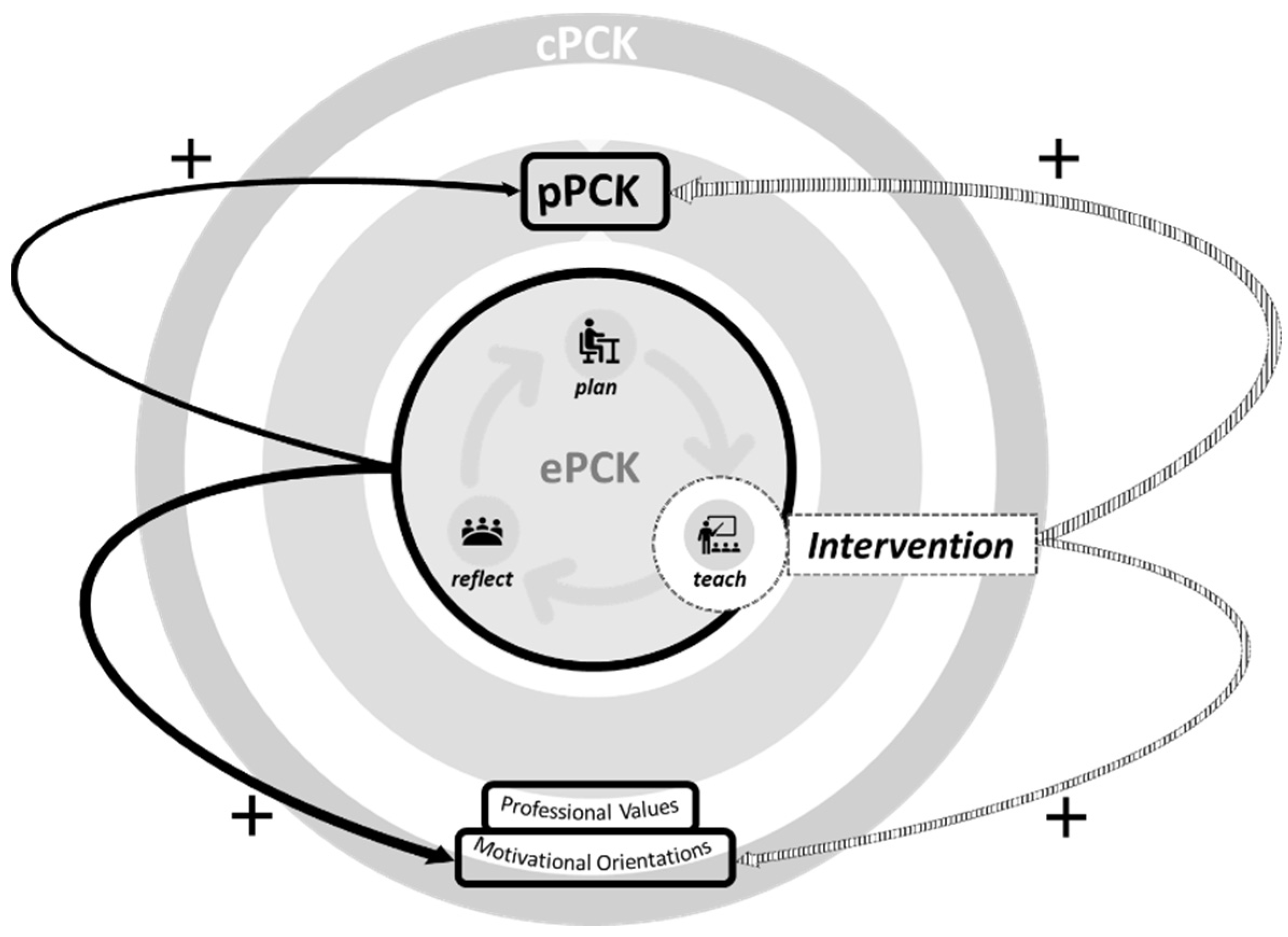Using the Plan–Teach–Reflect Cycle of the Refined Consensus Model of PCK to Improve Pre-Service Biology Teachers’ Personal PCK as Well as Their Motivational Orientations
Abstract
1. Introduction
1.1. The Refined Consensus Model of PCK (RCM)
1.2. Language in Teaching and Learning Biology
1.3. The RCM and the Language in Biology
2. Research Questions and Hypotheses
3. Methods
3.1. Setting
3.2. Design and Procedure
3.3. Sample
3.4. Intervention
3.5. Test Instruments
3.6. Data Analysis
3.6.1. Descriptive Analyses
3.6.2. ANOVA
4. Results
4.1. Correlations
4.2. Unpaired t-Tests
4.3. Mixed ANOVAs
5. Discussion
6. Limitations of the Research
7. Implications for Teacher Education
Author Contributions
Funding
Institutional Review Board Statement
Informed Consent Statement
Data Availability Statement
Conflicts of Interest
References
- OECD. PISA 2018 Results (Volume I). What Students Know and Can Do; OECD Publishing: Paris, France, 2018. [Google Scholar]
- Gogolin, I. Chancen und Risiken nach PISA—Über Bildungsbeteiligung von Migrantenkindern und Reformvorschläge. In Schieflagen im Bildungssystem; Die Benachteiligung der Migrantenkinder; Auernheimer, G., Ed.; Springer Fachmedien: Wiesbaden, Germany, 2013; pp. 33–50. [Google Scholar]
- Osborne, J. Science without Literacy: A Ship without a Sail? Camb. J. Educ. 2002, 32, 203–218. [Google Scholar] [CrossRef]
- Förtsch, C.; Werner, S.; Kotzebue, L.v.; Neuhaus, B.J. Effects of Biology Teachers’ Professional Knowledge and Cognitive Activation on Students’ Achievement. Int. J. Sci. Educ. 2016, 38, 2642–2666. [Google Scholar] [CrossRef]
- Alonzo, A.C.; Berry, A.; Nilsson, P. Unpacking the Complexity of Science Teachers’ PCK in Action: Enacted and Personal PCK. In Repositioning Pedagogical Content Knowledge in Teachers’ Knowledge for Teaching Science; Hume, A., Cooper, R., Boroswki, A., Eds.; Springer: Singapore, 2019; pp. 271–286. [Google Scholar]
- Alonzo, A.C.; Kim, J. Declarative and Dynamic Pedagogical Content Knowledge as Elicited through Two Video-Based Interview Methods. J. Res. Sci. Teach. 2016, 53, 1259–1286. [Google Scholar] [CrossRef]
- Carlson, J.; Daehler, K.R. The Refined Consensus Model of Pedagogical Content Knowledge in Science Education. In Repositioning Pedagogical Content Knowledge in Teachers’ Knowledge for Teaching Science; Hume, A., Cooper, R., Boroswki, A., Eds.; Springer: Singapore, 2019; pp. 77–92. [Google Scholar]
- Shulman, L.S. Those Who Understand: Knowledge Growth in Teaching. Educ. Res. 1986, 15, 4–14. [Google Scholar] [CrossRef]
- Koehler, M.J.; Mishra, P.; Cain, W. What Is Technological Pedagogical Content Knowledge (TPACK)? Cite J. 2009, 9, 60–70. [Google Scholar] [CrossRef]
- Koehler, M.J.; Mishra, P.; Kereluik, K.; Shin, T.S.; Graham, C.R. The Technological Pedagogical Content Knowledge Framework. In Handbook of Research on Educational Communications and Technology; Spector, J.M., Merrill, D.M., Elen, J., Bishop, M.J., Eds.; Springer: Singapore, 2014; pp. 101–111. [Google Scholar]
- Von Kotzebue, L. Two is better than one—Examining biology-specific TPACK and its T-dimensions from two angles. J. Res. Technol. Educ. 2022, 1–18. [Google Scholar] [CrossRef]
- Baumert, J.; Kunter, M. Das Kompetenzmodell von COACTIV. In Professionelle Kompetenz von Lehrkräften; Kunter, M., Baumert, J., Blum, W., Klusmann, U., Krauss, S., Neubrand, M., Eds.; Waxmann: Münster, Germany, 2011; pp. 29–54. [Google Scholar]
- Matt, A. Professionelle Kompetenz von Lehrkräftem—Was wissen und denken Lehrkräfte über sprachsensiblen Unterricht? In Schriftliche Hausarbeit gem. §29 der LPO I am Lehrstuhl für Didaktik der Biologie; LMU München: München, Germany, 2020. [Google Scholar]
- Baumert, J.; Kunter, M. Stichwort: Professionelle Kompetenz von Lehrkräften. ZfE 2006, 9, 469–520. [Google Scholar] [CrossRef]
- Flynn, T.; Bruce, C.D. Action Research as Professional Learning for Educators. In The Wiley Handbook of Action Research in Education; Mertler, C.A., Ed.; John Wiley & Sons: Hoboken, NJ, USA, 2019; pp. 273–294. [Google Scholar]
- Oser, F. Wann lernen Lehrer ihr Berufsethos? In Die Institutionalisierung von Lehren und Lernen; Leschinsky, A., Ed.; Beltz: Weinheim, Germany, 1996; pp. 235–243. [Google Scholar]
- Sunley, R.; Locke, R. Exploring UK secondary teachers’ professional values: An overview of the literature since 2000. Educ. Res. 2010, 52, 409–425. [Google Scholar] [CrossRef]
- Mecheril, P.; Quehl, T. Die Sprache der Schule. Eine migrationspädagogische Kritik der Bildungssprache. In Sprache und Bildung in Migrationsgesellschaften: Machtkritische Perspektiven auf ein prekarisiertes Verhältnis; Thoma, N., Knappig, M., Eds.; Transcript: Bielefeld, Germany, 2015; pp. 151–177. [Google Scholar]
- Paulsel, M.L.; Chory-Assad, R.M.; Dunleavy, K.N. The Relationship between Student Perceptions of Instructor Power and Classroom Justice. Commun. Res. Rep. 2005, 22, 207–215. [Google Scholar] [CrossRef]
- Schmidt, B. Den Anti-Bias-Ansatz zur Diskussion stellen. Beitrag zur Klärung theoretischer Grundlagen in der Anti-Bias-Arbeit; BIS-Verlag der Carl von Ossietzky Universität: Oldenburg, Germany, 2009. [Google Scholar]
- Tajmel, T.; Hägi-Mead, S. Sprachbewusste Unterrichtsplanung. Prinzipien, Methoden und Beispiele für die Umsetzung; Waxmann: Münster, Germany; New York, NY, USA, 2017. [Google Scholar]
- Palermo, C.; Thomson, M.M. Large-Scale Assessment as Professional Development: Teachers’ Motivations, Ability Beliefs, and Values. Teach. Dev. 2019, 23, 192–212. [Google Scholar] [CrossRef]
- Bardi, A.; Goodwin, R. The Dual Route to Value Change: Individual Processes and Cultural Moderators. J. Cross Cult. Psychol. 2011, 42, 271–287. [Google Scholar] [CrossRef]
- Gollan, T. Sozialer Einfluss auf Werthaltungen und seine Konsequenzen für kulturelle Diffusion. Ph.D. Thesis, Universität Hamburg, Hamburg, Germany, 2012. [Google Scholar]
- Ryndak, V.G.; Saldaeva, O.V. The Revival of Values and Meanings of the Teacher Education: Reflexive-Creative Approach. Cypriot J. Educ. Sci. 2019, 14, 266–277. [Google Scholar] [CrossRef][Green Version]
- Derman-Sparks, L. Anti-Bias Curriculum. Tools for Empowering Young Children; National Association for the Education of Young Children: Washington, DC, USA, 1989. [Google Scholar]
- Han, J.; Yin, H. Teacher Motivation: Definition, Research Development and Implications for Teachers. Cogent Educ. 2016, 3, 1217819. [Google Scholar] [CrossRef]
- Kunter, M. Motivation als Teil der professionellen Kompetenz—Forschungsbefunde zum Enthusiasmus von Lehrkräften. In Professionelle Kompetenz von Lehrkräften; Kunter, M., Baumert, J., Blum, W., Klusmann, U., Krauss, S., Neubrand, M., Eds.; Waxmann: Münster, Germany, 2011; pp. 259–275. [Google Scholar]
- Mitchell, T.R. Matching Motivational Strategies with Organizational Contexts. Res. Organ. Behav. 1997, 19, 57–149. [Google Scholar]
- Brouwers, A.; Tomic, W. A Longitudinal Study of Teacher Burnout and Perceived Self-Efficacy in Classroom Management. Teach. Teach. Educ. 2000, 16, 239–253. [Google Scholar] [CrossRef]
- Helmke, A. Unterrichtsqualität: Erfassen, Bewerten, Verbessern; Kallmeyersche Verlagsbuchhandlung: Seelze, Germany, 2003. [Google Scholar]
- Woolfolk Hoy, A.; Davis, H.; Pape, S.J. Teacher Knowledge and Beliefs. In Handbook of Educational Psychology; Alexander, P.A., Winne, P.H., Eds.; Routledge: New York, NY, USA, 2006; pp. 715–737. [Google Scholar]
- Ryan, R.M.; Deci, E.L. Intrinsic and Extrinsic Motivations: Classic Definitions and New Directions. Contemp. Educ. Psychol. 2000, 25, 54–67. [Google Scholar] [CrossRef] [PubMed]
- Seidel, T.; Stürmer, K. Modeling and Measuring the Structure of Professional Vision in Preservice Teachers. Am. Educ. Res. J. 2014, 51, 739–771. [Google Scholar] [CrossRef]
- Behling, F.; Förtsch, C.; Neuhaus, B.J. The Refined Consensus Model of Pedagogical Content Knowledge (PCK): Detecting Filters Between the Realms of PCK. Educ. Sci. 2022, 12, 592. [Google Scholar] [CrossRef]
- Prediger, S. Sprachbildung im Fachunterricht, ja klar, aber was genau, und wie? Überblicke und Einblicke in mathematikspezifische empirische Studien. In Fachgespräch, Ludwig-Maximilians; Universität München: München, Germany, 2017. [Google Scholar]
- Childs, P.E.; Markic, S.; Ryan, M.C. The Role of Language in the Teaching and Learning of Chemistry. In Chemistry Education: Best Practices, Opportunities and Trends; Garcia-Martinez, J., Serrano-Torregrosa, E., Eds.; Wiley-VCH: Weinheim, Germany, 2015; pp. 421–446. [Google Scholar]
- Prediger, S.; Wilhelm, N.; Büchter, A.; Gürsoy, E.; Benholz, C. Sprachkompetenz und Mathematikleistung—Empirische Untersuchung sprachlich bedingter Hürden in den Zentralen Prüfungen 10. J. Für Math. -Didakt. 2015, 36, 77–104. [Google Scholar] [CrossRef]
- Watermann, R.; Baumert, J. Entwicklung eines Strukturmodells zum Zusammenhang zwischen sozialer Herkunft und fachlichen und überfachlichen Kompetenzen: Befunde national und international vergleichender Analysen. In Herkunftsbedingte Disparitäten im Bildungswesen:Differenzielle Bildungsprozesse und Probleme der Verteilungsgerechtigkeit; Vertiefende Analysen im Rahmen von PISA 2000; Baumert, J., Stanat, P., Watermann, R., Eds.; VS Verlag für Sozialwissenschaften: Wiesbaden, Germany, 2006; pp. 61–94. [Google Scholar]
- Halliday, M.A.K. Learning How to Mean: Explorations in the Development of Language; Arnold: London, UK, 1975. [Google Scholar]
- Moschkovich, J.N. Academic Literacy in Mathematics for English Learners. J. Math. Behav. 2015, 40, 43–62. [Google Scholar] [CrossRef]
- Riebling, L. Heuristik der Bildungssprache. In Herausforderung Bildungssprache—Und wie man sie Meistert; Gogolin, I., Lange, I., Michel, U., Reich, H.H., Eds.; Waxmann: Münster, Germany, 2013; pp. 106–153. [Google Scholar]
- Nitz, S.; Nerdel, C.; Prechtl, H. Entwicklung eines Erhebungsinstruments zur Erfassung der Verwendung von Fachsprache im Biologieunterricht. Z. Für Didakt. Der Nat. 2012, 18, 117–139. [Google Scholar]
- Nitz, S.; Prechtl, H.; Nerdel, C. Survey of classroom use of representations: Development, field test and multilevel analysis. Learn. Environ. Res. 2014, 17, 401–422. [Google Scholar] [CrossRef]
- Drumm, S. Sprachbildung im Biologieunterricht; De Gruyter Mouton: Berlin, Germany, 2016. [Google Scholar]
- Taber, K.S. Exploring the Language(s) of Chemistry Education. Chem. Educ. Res. Pract. 2015, 16, 193–197. [Google Scholar] [CrossRef]
- Gogolin, I. Durchgängige Sprachbildung. Qualitätsmerkmale für den Unterricht; Waxmann: Münster, Germany, 2011. [Google Scholar]
- Lange, I. Bildungssprache. In Handbuch Mehrsprachigkeit und Bildung; Gogolin, I., Hansen, A., McMonagle, S., Rauch, D.P., Eds.; Springer VS: Wiesbaden, Germany, 2020; pp. 53–58. [Google Scholar]
- Snow, C.E. Academic language and the challenge of reading for learning about science. Science 2010, 328, 450–452. [Google Scholar] [CrossRef] [PubMed]
- Lange, I. Von ‘Schülerisch’ zu Bildungssprache. Übergänge zwischen Mündlichkeit und Schriftlichkeit im Konzept der Durchgängigen Sprachbildung. In Interkulturelle Pädagogik und Sprachliche Bildung; Fürstenau, S., Ed.; VS Verlag für Sozialwissenschaften: Wiesbaden, Germany, 2012; pp. 123–142. [Google Scholar]
- Mecheril, P.; Castro Varela, M.d.M.; Dirim, İ.; Kalpaka, A.; Melter, C. Migrationspädagogik; Beltz: Weinheim, Germany; Basel, Switzerland, 2010. [Google Scholar]
- Moore, F.M. Language in Science Education as a Gatekeeper to Learning, Teaching, and Professional Development. J. Sci. Teach. Educ. 2007, 18, 319–343. [Google Scholar] [CrossRef]
- Schleppegrell, M.J. Academic Language in Teaching and Learning. Elem. Sch. J. 2012, 112, 409–418. [Google Scholar] [CrossRef]
- Gogolin, I. “Bildungssprache”—The Importance of Teaching Language in Every School Subject. In Science Education Unlimited: Approaches to Equal Opportunities in Learning Science; Tajmel, T., Starl, K., Eds.; Waxmann: Münster, Germany, 2009; pp. 91–102. [Google Scholar]
- Kniffka, G. Scaffolding. Möglichkeiten, im Fachunterricht sprachliche Kompetenzen zu vermitteln [Scaffolding. Possibilities to impart linguistic competences in the subject]. In Grundlagen der Sprachdidaktik. Deutsch als Zweitsprache; [Basics of Language Education. German as a Second Language]; Kuchenreuther, M., Michalak, M., Eds.; Schneider Hohengehren: Baltmannsweiler, Germany, 2012; pp. 208–225. [Google Scholar]
- Phillips Galloway, E.; McClain, J.B.; Uccelli, P. Broadening the Lens on the Science of Reading: A Multifaceted Perspective on the Role of Academic Language in Text Understanding. Read. Res. Q. 2020, 55, S331–S345. [Google Scholar] [CrossRef]
- Prediger, S.; Wessel, L. Brauchen mehrsprachige Jugendliche eine andere fach- und sprachintegrierte Förderung als einsprachige? Z. Für Erzieh. 2018, 21, 361–382. [Google Scholar] [CrossRef]
- Tajmel, T.; Starl, K.; Schön, L.-H. Detect the Barriers and Leave Them Behind—Science Education in Culturally and Linguistically Diverse Classrooms. In Science Education Unlimited: Approaches to Equal Opportunities in Learning Science; Tajmel, T., Starl, K., Eds.; Waxmann: Münster, Germany, 2009; pp. 67–84. [Google Scholar]
- Markic, S. Chemistry Teachers’ Pedagogical Scientific Language Knowledge. In Research, Practice and Collaboration in Science Education, Proceedings of ESERA 2017; Finlayson, O.E., McLoughlin, E., Erduran, S., Childs, P., Eds.; Dublin City University: Dublin, Ireland, 2018; pp. 178–185. [Google Scholar]
- Markic, S. Heterogeneity—Challenge and/or Opportunity in Science Education. Sisyphus 2014, 2, 32–47. [Google Scholar]
- Mönch, C.; Markic, S. Science Teachers’ Pedagogical Scientific Language Knowledge—A Systematic Review. Educ. Sci. 2022, 12, 497. [Google Scholar] [CrossRef]
- Gogolin, I. Der monolinguale Habitus der multilingualen Schule; Waxmann: Münster, Germany, 1994. [Google Scholar]
- Gogolin, I. The”Monolingual Habitus” as the Common Feature in Teaching in the Language of the Majority in Different Countries. Per Ling. 1997, 13, 38–49. [Google Scholar] [CrossRef]
- Dirim, İ.; Springsits, B. “Wenn du ihn heute fragst: ‘Wie heißt das auf Ungarisch?’, will er’s nicht sagen.”—Zusammenhänge zwischen Sprache(n), Positionierung und Bildung. In Handeln in Organisationen der Migrationsgesellschaft; Mecheril, P., Rangger, M., Eds.; Springer Fachmedien: Wiesbaden, Germany, 2022; pp. 343–358. [Google Scholar]
- Gogolin, I. Stichwort: Mehrsprachigkeit. Z. Für Erzieh. 2010, 13, 529–547. [Google Scholar] [CrossRef]
- Mecheril, P.; Quehl, T. Sprache und Macht. Theoretische Facetten eines (migrations-)pädagogischen Zusammenhangs. In Die Macht der Sprachen: Englische Perspektiven auf die Mehrsprachige Schule; Mecheril, P., Quehl, T., Eds.; Waxmann: Münster, Germany, 2006; pp. 355–381. [Google Scholar]
- Lazarides, R.; Buchholz, J.; Rubach, C. Teacher Enthusiasm and Self-Efficacy, Student-Perceived Mastery Goal Orientation, and Student Motivation in Mathematics Classrooms. Teach. Teach. Educ. 2018, 69, 1–10. [Google Scholar] [CrossRef]
- Wigfield, A.; Eccles, J.S. Expectancy-Value Theory of Achievement Motivation. Contemp. Educ. Psychol. 2000, 25, 68–81. [Google Scholar] [CrossRef]
- Boone, W.J.; Staver, J.R.; Yale, M.S. Rasch Analysis in the Human Sciences; Springer Netherlands: Dordrecht, The Netherlands, 2014. [Google Scholar]
- Linacre, J.M. USCALE= the User-Scaled Value of 1 Logit = 1. Available online: https://winsteps.com/winman/uscale.htm (accessed on 13 July 2022).
- Linacre, J.M. User’s Guide to Winsteps®Ministeps Rasch-Model Computer Programs. Program Manual 5.2.4. Available online: https://www.winsteps.com/a/Winsteps-Manual.pdf (accessed on 13 July 2022).
- Boone, W.J.; Noltemeyer, A. Rasch Analysis: A Primer for School Psychology Researchers and Practitioners. Cogent Educ. 2017, 4, 1416898. [Google Scholar] [CrossRef]
- Wright, B.D.; Linacre, J.M. Reasonable Mean-Square Fit Values. Rasch Meas. Trans. 1994, 8, 370. [Google Scholar]
- Jüttner, M.; Boone, W.; Park, S.; Neuhaus, B.J. Development and Use of a Test Instrument to Measure Biology Teachers’ Content Knowledge (CK) and Pedagogical Content Knowledge (PCK). Educ. Assess. Evaluation Account 2013, 25, 45–67. [Google Scholar] [CrossRef]
- Reeves, T.D.; Marbach-Ad, G. Contemporary Test Validity in Theory and Practice: A Primer for Discipline-Based Education Researchers. CBE Life Sci. Educ. 2016, 15, rm1. [Google Scholar] [CrossRef]
- Wiggins, G.P.; McTighe, J. Understanding by Design; Association for Supervision and Curriculum Development: Alexandria, VA, USA, 2005. [Google Scholar]
- Aryadoust, S.V. Mapping Rasch-Based Measurement onto the Argument-Based Validity Framework. Rasch Meas. Trans. 2009, 23, 1192–1193. [Google Scholar]
- Boone, W.; Rogan, J. Rigour in Quantitative Analysis: The Promise of Rasch Analysis Techniques. Afr. J. Res. Math. Sci. Technol. Educ. 2005, 9, 25–38. [Google Scholar] [CrossRef]
- Planinic, M.; Boone, W.J.; Susac, A.; Ivanjek, L. Rasch Analysis in Physics Education Research: Why Measurement Matters. Phys. Rev. Phys. Educ. Res. 2019, 15, 020111. [Google Scholar] [CrossRef]
- Leisen, J. Handbuch Fortbildung Sprachförderung im Fach. Sprachsensibler Fachunterricht in der Praxis; Ernst Klett Sprachen: Stuttgart, Germany, 2017. [Google Scholar]
- Beese, M.; Kleinpaß, A.; Krämer, S.; Reschke, M.; Rzeha, S.; Wiethoff, M. Praxishandbuch Sprachbildung in Biologie: Sprachsensibel unterrichten—Sprache Fördern; Klett: Stuttgart, Germany, 2015. [Google Scholar]
- Behling, F.; Förtsch, C.; Neuhaus, B.J. Sprachsensibler Biologieunterricht—Förderung professioneller Handlungskompetenz und professioneller Wahrnehmung durch videogestützte live-Unterrichtsbeobachtung. Eine Projektbeschreibung. Z. Für Didakt. Der Nat. 2019, 25, 307–316. [Google Scholar] [CrossRef]
- Nitz, S.; Enzingmüller, C.; Prechtl, H.; Nerdel, C. Fachsprache im naturwissenschaftlichen Unterricht—Eine empirische Untersuchung zur Einstellung angehender Lehrkräfte. Unterrichtswissenschaft 2011, 39, 245–262. [Google Scholar]
- Eccles, J.S.; Adler, T.F.; Futterman, R.; Goff, S.B.; Kaczala, C.M.; Meece, J.L.; Midgley, C. Expectancies, Values, and Academic Behaviors. In Achievement and Achievement Motives. Psychological and Sociological Approaches; Spence, J.T., Ed.; W.H.Freeman: San Francisco, CA, USA, 1983; pp. 75–146. [Google Scholar]
- Förtsch, C.; Sczudlek, M.; Neuhaus, B.J. Kompetenzorientierung und Aufgabenkultur im Natur-und-Technik-Unterricht. Eine Videostudie. In Erkenntnisweg Biologiedidaktik 12; Krüger, D., Schmiemann, P., Möller, A., Dittmer, A., Zabel, J., Eds.; Universitätsdruckerei: Kassel, Germany, 2013; pp. 75–88. [Google Scholar]
- Hitlin, S.; Piliavin, J.A. Values: Reviving a Dormant Concept. Annu. Rev. Sociol. 2004, 30, 359–393. [Google Scholar] [CrossRef]
- Maio, G.R.; Olson, J.M. Values as Truisms: Evidence and Implications. J. Pers. Soc. Psychol. 1998, 74, 294–311. [Google Scholar] [CrossRef]
- Alwin, D.F. Trends in Parental Socialization Values: Detroit, 1958–1983. Am. J. Sociol. 1984, 90, 359–382. [Google Scholar] [CrossRef]
- Brady, L. Teacher Values and Relationship: Factors in Values Education. Aust. J. Teach. Educ. 2011, 36, 56–66. [Google Scholar] [CrossRef]
- Corrigan, D.; Smith, K. The Role of Values in Teaching and Learning Science. In Inclusive Pedagogy across the Curriculum; Deppeler, J.M., Loreman, T., Smith, R., Florian, L., Eds.; Emerald Group Publishing Limited: New Delhi, India, 2015; pp. 99–117. [Google Scholar] [CrossRef]
- Berger, J.-L.; Girardet, C.; Vaudroz, C.; Crahay, M. Teaching Experience, Teachers’ Beliefs, and Self-Reported Classroom Management Practices: A Coherent Network. SAGE Open 2018, 8. [Google Scholar] [CrossRef]
- Biesta, G.; Priestley, M.; Robinson, S. The Role of Beliefs in Teacher Agency. Teach. Teach. 2015, 21, 624–640. [Google Scholar] [CrossRef]
- Taylor, Z.W. Linguistic Hurdles Faced by English L2 Speakers Pursuing U.S. Higher Education: What the Research Tells Us and Pathways Forward. Essays Educ. 2021, 27, 4. [Google Scholar]
- Childs, P.E.; Ryan, M. LiSP: The Language in Science Project. In Research, Practice and Collaboration in Science Education. Proceedings of ESERA 2017; Finlayson, O.E., McLoughlin, E., Erduran, S., Childs, P., Eds.; Dublin City University: Dublin, Ireland, 2018; pp. 186–195. [Google Scholar]
- Markic, S.; Childs, P.E. Language and the Teaching and Learning of Chemistry. Chem. Educ. Res. Pract. 2016, 17, 434–438. [Google Scholar] [CrossRef]
- Behling, F.; Förtsch, C.; Neuhaus, B.J. Using the Refined Consensus Model of Pedagogical Content Knowledge to Improve Pre-Service Biology Teachers’ Lesson Planning. J. Sci. Teach. Educ. 2022, submitted.
- Kotzebue, L.v. Beliefs, Self-reported or Performance-Assessed TPACK: What Can Predict the Quality of Technology-Enhanced Biology Lesson Plans? J. Sci. Educ. Technol. 2022, 31, 570–582. [Google Scholar] [CrossRef]
- Linacre, J.M. Reliability and Separation of Measures. Available online: https://www.winsteps.com/winman/reliability.htm (accessed on 14 September 2022).
- Santagata, R.; Yeh, C. Learning to Teach Mathematics and to Analyze Teaching Effectiveness: Evidence from a Video- and Practice-Based Approach. J. Math. Teach. Educ. 2014, 17, 491–514. [Google Scholar] [CrossRef]




| Variable | Number of Items | All Item Infit MNSQ | All Item Outfit MNSQ | Item Reliability | Person Reliability | ICC (Unjust) |
|---|---|---|---|---|---|---|
| pPCK | N = 12 | <1.4 | <1.5 | 0.97 | 0.88 | ICC (59,59) = 0.91, p < 0.001 |
| Professional Values | N = 20 | <1.5 | <1.5 | 0.97 | 0.36 | - |
| Motivational Orientations | N = 36 | <1.5 | <1.5 | 0.93 | 0.89 | - |
| Variable | Mean of Person Ability Score | SD | Min | Max | ||||
|---|---|---|---|---|---|---|---|---|
| Group | Treatment | Control | Treatment | Control | Treatment | Control | Treatment | Control |
| pPCKpre | 47.36 | 47.80 | 1.22 | 0.44 | 43.92 | 46.78 | 48.41 | 48.31 |
| pPCKpost | 48.25 | 47.81 | 0.48 | 1.42 | 47.20 | 42.58 | 49.31 | 52.83 |
| Professional Valuespre | 51.90 | 51.85 | 0.35 | 0.44 | 51.52 | 51.17 | 52.83 | 52.63 |
| Professional Valuespost | 52.00 | 51.85 | 0.49 | 0.49 | 51.41 | 50.81 | 53.43 | 52.67 |
| Motivational Orientationspre | 48.92 | 48.36 | 0.45 | 0.35 | 48.10 | 47.61 | 49.57 | 49.00 |
| Motivational Orientationspost | 49.49 | 49.47 | 0.67 | 0.83 | 48.45 | 47.79 | 50.63 | 51.28 |
| Variable | pPCKpre | Professional Valuespre | Motivational Orientationspre |
|---|---|---|---|
| pPCKpre | 1 | ||
| Professional Valuespre | 0.27 | 1 | |
| Motivational Orientationspre | −0.09 | 0.33 | 1 |
| Variable | pPCKpre | Professional Valuespre | Motivational Orientationspre | |||
|---|---|---|---|---|---|---|
| Group | Treatment | Control | Treatment | Control | Treatment | Control |
| t | T(17.18) = 1.33 | T(26) = −0.35 | T(26) = −0.63 | |||
| p | 0.10 | 0.73 | 0.001 | |||
| d | - | - | 1.37 | |||
| 95%CI | [−0.2578, 1.1399] | [−0.3657, 0.2596] | [−0.8691, −0.2410] | |||
| Hypothesis | Dependent Variable | F | p (One-Tailed) | Part. η2 | d |
|---|---|---|---|---|---|
| H1 | Effect of time | ||||
| H1a | pPCK | F(1,28) = 3.51 | 0.04 | 0.11 | 0.70 |
| H1b | Professional Values | F(1,24) = 0.05 | 0.41 | - | - |
| H1c | Motivational Orientations | F(1,23) = 29.68 | <0.001 | 0.56 | 2.26 |
| H2 | Interaction effect | ||||
| H2a | pPCK | F(1,28) = 2.92 | 0.04 | 0.10 | 0.67 |
| H2b | Professional Values | F(1,24) = 0.47 | 0.25 | - | - |
| H2c | Motivational Orientations | F(1,23) = 7.64 | <0.01 | 0.25 | 1.15 |
Publisher’s Note: MDPI stays neutral with regard to jurisdictional claims in published maps and institutional affiliations. |
© 2022 by the authors. Licensee MDPI, Basel, Switzerland. This article is an open access article distributed under the terms and conditions of the Creative Commons Attribution (CC BY) license (https://creativecommons.org/licenses/by/4.0/).
Share and Cite
Behling, F.; Förtsch, C.; Neuhaus, B.J. Using the Plan–Teach–Reflect Cycle of the Refined Consensus Model of PCK to Improve Pre-Service Biology Teachers’ Personal PCK as Well as Their Motivational Orientations. Educ. Sci. 2022, 12, 654. https://doi.org/10.3390/educsci12100654
Behling F, Förtsch C, Neuhaus BJ. Using the Plan–Teach–Reflect Cycle of the Refined Consensus Model of PCK to Improve Pre-Service Biology Teachers’ Personal PCK as Well as Their Motivational Orientations. Education Sciences. 2022; 12(10):654. https://doi.org/10.3390/educsci12100654
Chicago/Turabian StyleBehling, Franziska, Christian Förtsch, and Birgit J. Neuhaus. 2022. "Using the Plan–Teach–Reflect Cycle of the Refined Consensus Model of PCK to Improve Pre-Service Biology Teachers’ Personal PCK as Well as Their Motivational Orientations" Education Sciences 12, no. 10: 654. https://doi.org/10.3390/educsci12100654
APA StyleBehling, F., Förtsch, C., & Neuhaus, B. J. (2022). Using the Plan–Teach–Reflect Cycle of the Refined Consensus Model of PCK to Improve Pre-Service Biology Teachers’ Personal PCK as Well as Their Motivational Orientations. Education Sciences, 12(10), 654. https://doi.org/10.3390/educsci12100654






